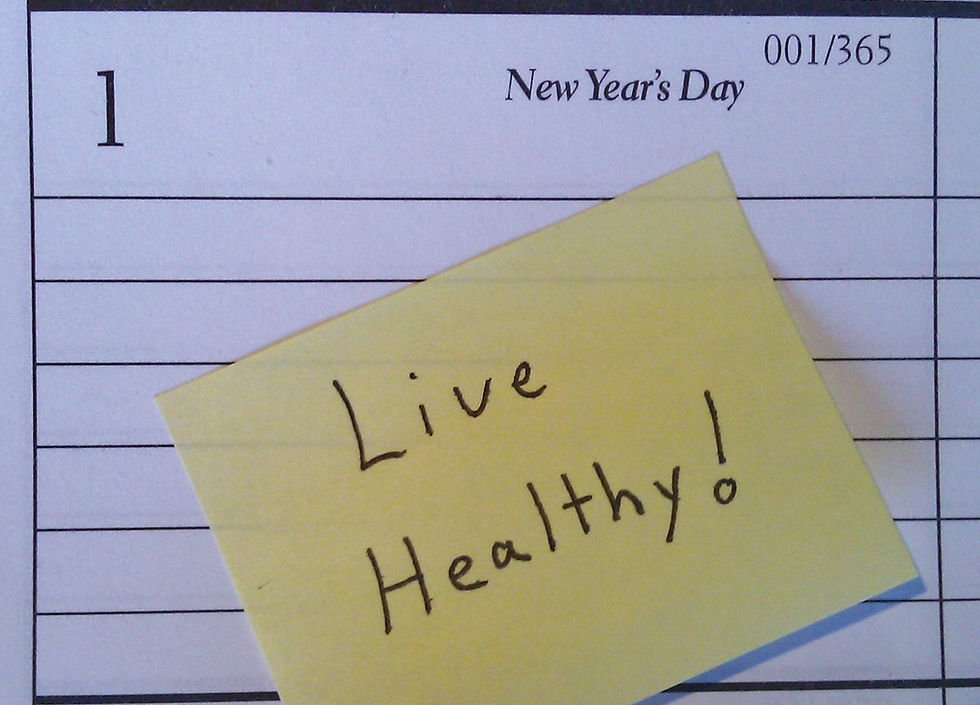20 Tips To Stick To Your New Year Health Resolution
- Lifestylist Health & Fitness
- Jan 2, 2018
- 3 min read
Every new year we set about making New Year's resolutions. These 20 tips will help improve your physical, emotional and mental health for life not just for the new year:

The more we learn about the relationship between the gut and the brain, the more evidence we get about the role of nutrition in mental health. People who consume more fruits and vegetables have lower levels of depression than those who eat less fruit and vegetables.Nutritional improvements over time (a balance of vegetables, fruits, grains and proteins) can improve your mental health and quality of life. Eating leafy greens and vegetables in the broccoli family (cabbage, cauliflower, kale) may even help slow cognitive decline.
Include a handful of nuts mid-afternoon – they’ll satisfy the 3pm munchies, help with weight management and reduce blood cholesterol
Consider seeing an accredited practising dietitian or personal trainer. There’s no quick fix, but professional help is a worthwhile investment
Remember that every glass of wine takes 15 minutes of walking to burn off. If you don’t have time to exercise, don’t drink!
Exercise is one of the most effective ways of reducing depression or anxiety, improving sexual function, and maintaining cognitive function.It doesn't matter if you're walking around your back yard or running a marathon – any sort of movement is going to help you. Adhering to an exercise plan can be hard. Aim to identify exercise you find enjoyable, that gets you out socialising, and that allows you to build competence.
Create a supportive food environment to make healthy choices easy. Stock your kitchen pantry and fridge with mostly healthy food and take lunch to work
When weeks get busy, double your recipes and cook twice as much. Freeze the other half for your very own convenience meals
Don’t love it? Don’t eat it. Life is too short to eat poor quality food, so choose the best you can afford – and savour it
Make a list of 10 quick and easy meals to stick on the fridge. Then, when you’re too tired to think about dinner, you’ll have some options in front of you
Have a treat each day. A glass of wine or a piece of dark chocolate is essential for sticking to your diet the rest of the time
After an extended period of dieting, give your body a rest. A diet too low in calories can actually stimulate appetite, so include a day off each week. My day is Sunday night with my family!
Work out exactly how you want to feel in 2018. Set your health goals with that in mind
Read up regularly on relevant health issues. If you suffer from any disease, keeping up-to-date can give you a sense of control
Don’t set yourself up for failure. Your resolutions should be achievable, enjoyable and realistic – not impossible
Know your excuses. Is it ‘too cold’ to exercise or are you ‘too busy’? Develop ways to overcome them
Plan your work-outs each week. Map out the time you plan to exercise otherwise if it's not in the diary, you won't do it!
Eat a salad every day. They fill you up without overloading you – even with olive oil and balsamic dressing
Start each meal with a large glass of water. It will reduce sensations of hunger, distend your stomach and leave you feeling fuller
Don’t ‘overhaul’ your diet. Big changes never last, but you can stick to small ones like cutting down sugar or processed packet foods
Try cooking two new healthy recipes each week or having two nights free of alcohol during the week
Hope this helps
Suzanne
Lifestylist Health & Fitness


Comments